(word完整版)高中英语选修六笔记
(完整word版)人教版高中英语选修六知识点总结
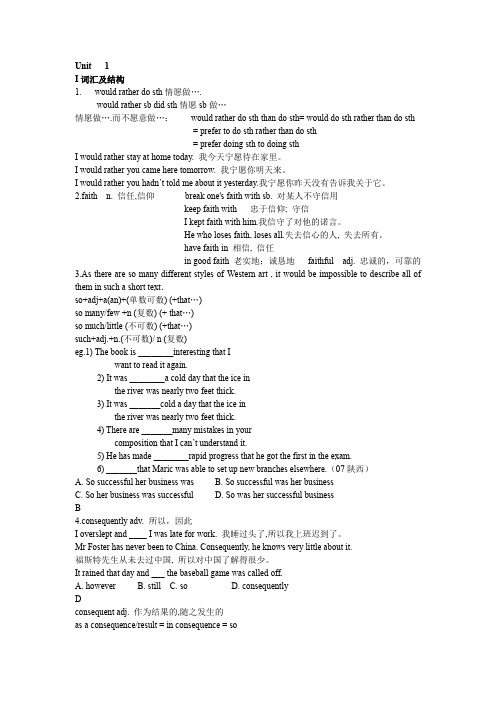
Unit 1I词汇及结构1. would rather do sth情愿做….would rather sb did sth情愿sb做…情愿做….而不愿意做…:would rather do sth than do sth= would do sth rather than do sth= prefer to do sth rather than do sth= prefer doing sth to doing sthI would rather stay at home today. 我今天宁愿待在家里。
I would rather you came here tomorrow. 我宁愿你明天来。
I would rather you hadn’t told me about it yesterday.我宁愿你昨天没有告诉我关于它。
2.faith n. 信任,信仰break one's faith with sb. 对某人不守信用keep faith with 忠于信仰; 守信I kept faith with him.我信守了对他的诺言。
He who loses faith, loses all.失去信心的人, 失去所有。
have faith in 相信, 信任in good faith 老实地;诚恳地faithful adj. 忠诚的,可靠的3.As there are so many different styles of Western art , it would be impossible to describe all of them in such a short text.so+adj+a(an)+(单数可数) (+that…)so many/few +n (复数) (+ that…)so much/little (不可数) (+that…)such+adj.+n.(不可数)/ n (复数)eg.1) The book is ________interesting that Iwant to read it again.2) It was ________a cold day that the ice inthe river was nearly two feet thick.3) It was _______cold a day that the ice inthe river was nearly two feet thick.4) There are _______many mistakes in yourcomposition that I can’t understand it.5) He has made ________rapid progress that he got the first in the exam.6) _______that Maric was able to set up new branches elsewhere.(07陕西)A. So successful her business wasB. So successful was her businessC. So her business was successfulD. So was her successful businessB4.consequently adv. 所以,因此I overslept and ____ I was late for work. 我睡过头了,所以我上班迟到了。
选修六英语知识点归纳总结

选修六英语知识点归纳总结选修六英语课程是高中阶段的一门英语课程,它主要针对学生的英语学习能力和应用能力进行培养和提升。
该课程的重点在于拓宽学生的英语知识面,提高学生的语言运用能力,并通过阅读与写作的训练来提高学生的综合素养。
以下是选修六英语课程的知识点总结。
1. 阅读技巧:选修六英语课程注重培养学生的阅读能力,包括理解文章主旨、提取关键信息、推理判断等技巧。
学生需要通过大量的阅读练习来积累词汇量和语言表达能力,提高阅读速度和准确性。
2. 写作技巧:选修六英语课程还注重培养学生的写作能力,包括写作结构、篇章连贯、语言表达等方面的技巧。
学生需要通过模仿与实践,掌握不同文体(如记叙文、议论文等)的写作要点,并提高语言的准确性和表达的流畅性。
3. 词汇扩展:选修六英语课程会引导学生通过各种途径扩大词汇量,包括通过背单词、阅读英文文章、听力训练等。
学生需要积极主动地进行词汇的积累,并注意词汇的正确使用。
4. 语法知识:选修六英语课程也会涉及一定的语法知识,包括时态、语态、从句、非谓语动词等。
学生需要掌握这些基础语法知识,并能够在写作和阅读中正确运用。
5. 听力训练:选修六英语课程注重培养学生的听力能力,包括听取信息、理解对话、听写等技巧。
学生需要通过大量的听力材料进行训练,提高听力的准确性和听取关键信息的能力。
6. 口语表达:选修六英语课程也会培养学生的口语表达能力,包括对话、演讲、辩论等形式的口语训练。
学生需要通过与同学的交流、角色扮演等活动来提高口语表达的流利度和准确性。
7. 学术写作:选修六英语课程会引导学生进行学术写作训练,包括文献综述、实验报告、研究论文等形式的写作。
学生需要掌握学术写作的特点和要求,提高逻辑思维能力和文献搜集整理能力。
8. 阅读理解:选修六英语课程注重培养学生的阅读理解能力,包括理解文章的主旨、推理判断作者观点等技巧。
学生需要通过不同类型的阅读材料进行训练,提高阅读理解的准确性和判断能力。
高中英语选修六知识点总结
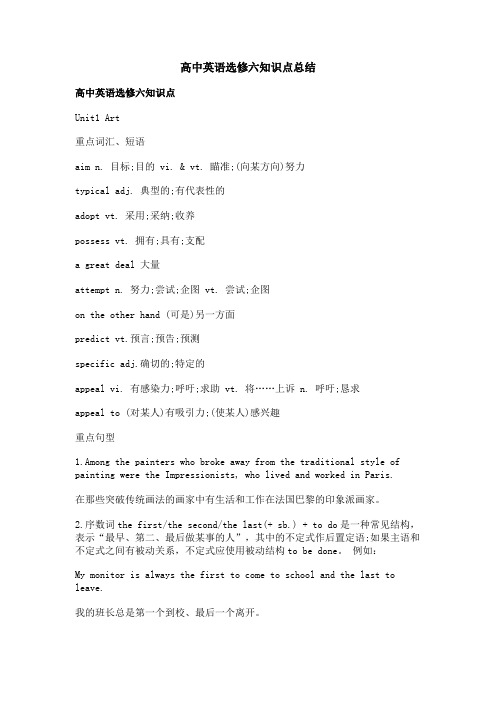
高中英语选修六知识点总结高中英语选修六知识点Unit1 Art重点词汇、短语aim n. 目标;目的 vi. & vt. 瞄准;(向某方向)努力typical adj. 典型的;有代表性的adopt vt. 采用;采纳;收养possess vt. 拥有;具有;支配a great deal 大量attempt n. 努力;尝试;企图 vt. 尝试;企图on the other hand (可是)另一方面predict vt.预言;预告;预测specific adj.确切的;特定的appeal vi. 有感染力;呼吁;求助 vt. 将……上诉 n. 呼吁;恳求appeal to (对某人)有吸引力;(使某人)感兴趣重点句型1.Among the painters who broke away from the traditional style of painting were the Impressionists, who lived and worked in Paris.在那些突破传统画法的画家中有生活和工作在法国巴黎的印象派画家。
2.序数词the first/the second/the last(+ sb.) + to do是一种常见结构,表示“最早、第二、最后做某事的人”,其中的不定式作后置定语;如果主语和不定式之间有被动关系,不定式应使用被动结构to be done。
例如:My monitor is always the first to come to school and the last to leave.我的班长总是第一个到校、最后一个离开。
To tell the truth, he was the last person to be met with by the manager.说实话,他是最后一个被经理接见的人。
3.It is amazing/surprising/astonishing/shocking that...是一种常见句型,表示“……令人吃惊、震惊、惊讶等”,其中it是形式主语,that引导主语从句作句子的真正主语。
高二英语选修6知识点总结
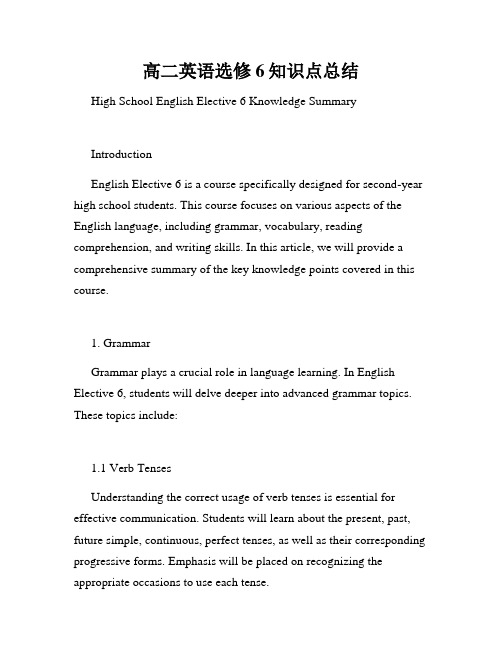
高二英语选修6知识点总结High School English Elective 6 Knowledge SummaryIntroductionEnglish Elective 6 is a course specifically designed for second-year high school students. This course focuses on various aspects of the English language, including grammar, vocabulary, reading comprehension, and writing skills. In this article, we will provide a comprehensive summary of the key knowledge points covered in this course.1. GrammarGrammar plays a crucial role in language learning. In English Elective 6, students will delve deeper into advanced grammar topics. These topics include:1.1 Verb TensesUnderstanding the correct usage of verb tenses is essential for effective communication. Students will learn about the present, past, future simple, continuous, perfect tenses, as well as their corresponding progressive forms. Emphasis will be placed on recognizing the appropriate occasions to use each tense.1.2 Sentence StructureSentence structure is the backbone of English syntax. Students will learn about the different sentence types, such as declarative, interrogative, imperative, and exclamatory sentences. Additionally, they will study complex sentences, compound sentences, and the correct usage of clauses and phrases within a sentence.1.3 Parts of SpeechA solid understanding of parts of speech is necessary for constructing accurate sentences. Students will explore the functions and classifications of nouns, pronouns, verbs, adjectives, adverbs, prepositions, conjunctions, and interjections. They will also learn about subject-verb agreement and the correct use of articles.2. VocabularyExpanding one's vocabulary is crucial for enhancing language proficiency. In English Elective 6, students will encounter a wide range of vocabulary items. These include:2.1 Word FormationStudents will study the formation of words through prefixes, suffixes, and root words. This knowledge will enable them to decode unfamiliar words and understand their meanings within different contexts.2.2 Synonyms, Antonyms, and HomonymsLearning synonyms, antonyms, and homonyms will assist students in developing a nuanced understanding of vocabulary. They will learn how to differentiate between words with similar or opposite meanings and understand how context affects word usage.2.3 Idioms and Phrasal VerbsIdioms and phrasal verbs are common expressions in the English language. Students will explore their meanings and usage, enabling them to communicate more naturally and fluently.3. Reading ComprehensionEffective reading comprehension skills are crucial for understanding various types of texts. In English Elective 6, students will develop the following reading skills:3.1 Skimming and ScanningSkimming and scanning are techniques that help readers quickly gather information from a text. Students will practice these skills to locate specific details and main ideas efficiently.3.2 Inference and DeductionStudents will enhance their ability to make inferences and deduce information that may not be directly stated in the text. They will learn to analyze the context and use clues to understand implicit meanings.3.3 Critical Thinking and AnalysisDeveloping critical thinking skills is essential for analyzing and interpreting texts. Students will learn how to evaluate the credibility of information, recognize bias, and identify the main arguments and supporting evidence presented.4. Writing SkillsStrong writing skills enable effective communication and expression of ideas. English Elective 6 emphasizes the following aspects of writing:4.1 Essay WritingStudents will learn how to structure and organize their ideas effectively when writing essays. They will practice writing introductions, body paragraphs, and conclusions, while also mastering the use of appropriate academic language and cohesive devices.4.2 Formal and Informal WritingUnderstanding the differences between formal and informal writing styles is crucial. Students will learn to adapt their writing to different contexts, such as academic essays, letters, emails, and social media posts.4.3 Sentence Variety and CohesionDeveloping sentence variety and cohesion improves the overall flow and readability of a piece of writing. Students will practice using different sentence structures, transition words, and phrases to connect ideas smoothly.ConclusionEnglish Elective 6 covers a wide range of knowledge points, including grammar, vocabulary, reading comprehension, and writing skills. By developing a strong foundation in these areas, second-yearhigh school students can enhance their English language proficiency and effectively communicate in various contexts.。
(完整word版)人教版高中英语选修六知识点总结

(完整word版)人教版高中英语选修六知识点总结Unit 1I词汇及结构1. would rather do sth情愿做….would rather sb did sth情愿sb做…情愿做….而不愿意做…:would rather do sth than do sth= would do sth rather than do sth= prefer to do sth rather than do sth= prefer doing sth to doing sthI would rather stay at home today. 我今天宁愿待在家里。
I would rather you came here tomorrow. 我宁愿你明天来。
I would rather you hadn’t told me about it yesterday.我宁愿你昨天没有告诉我关于它。
2.faith n. 信任,信仰break one's faith with sb. 对某人不守信用keep faith with 忠于信仰; 守信I kept faith with him.我信守了对他的诺言。
He who loses faith, loses all.失去信心的人, 失去所有。
have faith in 相信, 信任in good faith 老实地;诚恳地faithful adj. 忠诚的,可靠的3.As there are so many different styles of Western art , it would be impossible to describe all of them in such a short text.so+adj+a(an)+(单数可数) (+that…)so many/few +n (复数) (+ that…)so much/little (不可数) (+that…)such+adj.+n.(不可数)/ n (复数)eg.1) The book is ________interesting that Iwant to read it again.2) It was ________a cold day that the ice inthe river was nearly two feet thick.3) It was _______cold a day that the ice inthe river was nearly two feet thick.4) There are _______many mistakes in yourcomposition that I can’t understand it.5) He has made ________rapid progress that he got the first in the exam.6) _______that Maric was able to set up new branches elsewhere.(07陕西)A. So successful her business wasB. So successful was her businessC. So her business was successfulD. So was her successful businessB4.consequently adv. 所以,因此I overslept and ____ I was late for work. 我睡过头了,所以我上班迟到了。
高二英语选修六的必会知识点分析
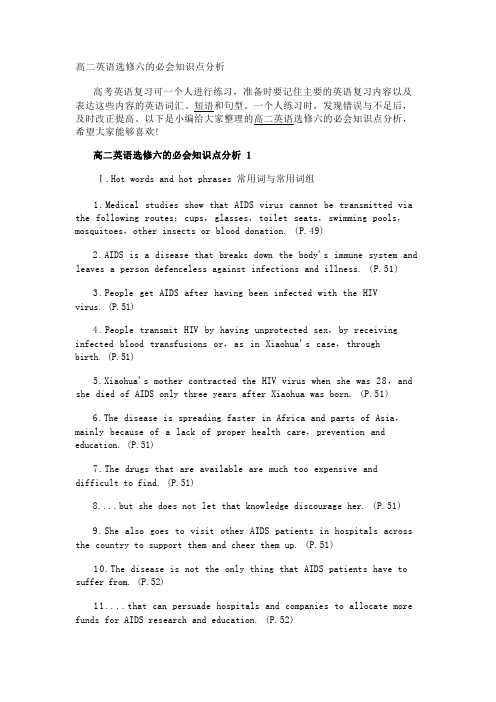
高二英语选修六的必会知识点分析高考英语复习可一个人进行练习,准备时要记住主要的英语复习内容以及表达这些内容的英语词汇、短语和句型。
一个人练习时,发现错误与不足后,及时改正提高。
以下是小编给大家整理的高二英语选修六的必会知识点分析,希望大家能够喜欢!Ⅰ.Hot words and hot phrases 常用词与常用词组1.Medical studies show that AIDS virus cannot be transmitted via the following routes:cups,glasses,toilet seats,swimming pools,mosquitoes,other insects or blood donation. (P.49)2.AIDS is a disease that breaks down the body's immune system and leaves a person defenceless against infections and illness. (P.51)3.People get AIDS after having been infected with the HIVvirus. (P.51)4.People transmit HIV by having unprotected sex,by receiving infected blood transfusions or,as in Xiaohua's case,through birth. (P.51)5.Xiaohua's mother contracted the HIV virus when she was 28,and she died of AIDS only three years after Xiaohua was born. (P.51)6.The disease is spreading faster in Africa and parts of Asia,mainly because of a lack of proper health care,prevention and education. (P.51)7.The drugs that are available are much too expensive anddifficult to find. (P.51)8....but she does not let that knowledge discourage her. (P.51)9.She also goes to visit other AIDS patients in hospitals across the country to support them and cheer them up. (P.51)10.The disease is not the only thing that AIDS patients have to suffer from. (P.52)11....that can persuade hospitals and companies to allocate more funds for AIDS research and education. (P.52)12.Xiaohua has learnt to live with HIV and the fact she will eventually get AIDS. (P.52)13.Two years ago,Dr Richards had asked me a great many questions and had taken samples of my blood. (P.55)14.Mum held my hand and I saw that she was weeping. (P.55)15.Cancer is a disease that begins in cells. (P.55)16.In my body,the production of cells is disrupted. (P.55)17.Doctors do know that cancer is not caused by injury and is not contagious— it does not spread from one person to another. (P.55)18.The cancer in my body has been defeated for the moment. (P.55)19.Living with cancer has made me realize how precious life is and how important it is for us to take every chance to live life to the fullest. (P.55)20.Every day is a new opportunity and I have learnt to appreciate every minute of each day.Ⅱ.Language points and grammar focus 语言点和语法重点nguage points 语言点1.HIV/AIDS is incurable... (P.49)AIDS is a disease that...leaves a person defenceless against infections and illness. (P.51)本单元中由前缀或后缀派生出的反义词的小结2.People get AIDS after having been infected with the HIVvirus. (P.51)完成时的动名词的被动式的内涵及用法3.As with most diseases and disasters,the young suffer the most.“定冠词 + 形容词/过去分词”表示“一类人”的用法的小结4.I had been feeling sick for a long time and my mum had taken me to hospital to have me examined. (P.55)1)过去完成进行时的内涵及用法2)“to have + 宾语 + 过去分词”的两个内涵及用法5.The treatment was successful and I was able to go home after exactly fourteen months,two days and six hours in hospital. (P.55)was/were able to do 与 could do 在内涵上的区别及各自的用法6.I have been living with cancer for two years and... (P.55)现在完成进行时的内涵及用法Ⅲ.Skills of the four essential abilities:listening,speaking,reading and writing 听、说、读、写四项基本能力的学习技巧1.Listening:Master the main idea of a long dialogue through the inner connections among the questions so as to have better understanding of the questioned details从各设问间的内在联系把握较长对话的中心思想,更好理解各检测点的细节2.Speaking:Talk about deadly diseases and attitudes towards AIDS,cancer,etc.关于那些致命疾病及对待艾滋病、癌症等的态度的谈论3.Reading:Make full use of informational words and phrases充分利用信息词4.Writing:How to write a personal narrative如何写一篇个人经历过的叙述性故事一、重点词汇总结1. impression n. 印记;印象;感想;后接 of sb./ of sth./ on sb./ that 从句; My first impression of him was favorable.他给我的第一印象非常讨人喜欢。
高中英语选修六的知识点总结
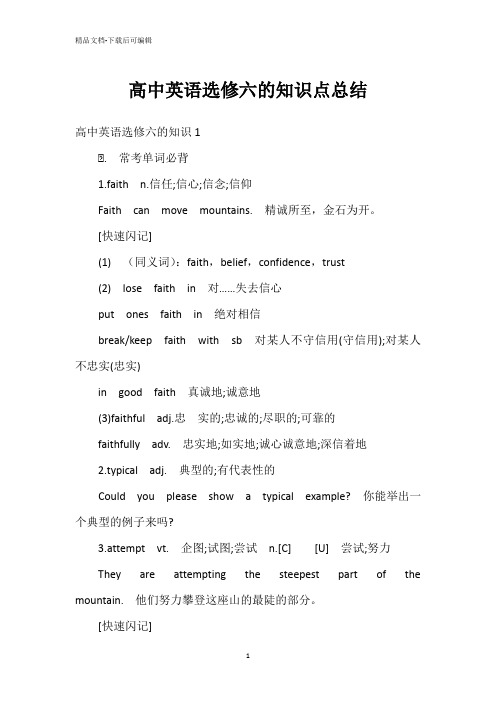
高中英语选修六的知识点总结高中英语选修六的知识1Ⅰ. 常考单词必背1.faith n.信任;信心;信念;信仰Faith can move mountains. 精诚所至,金石为开。
[快速闪记](1) (同义词):faith,belief,confidence,trust(2) lose faith in 对……失去信心put ones faith in 绝对相信break/keep faith with sb 对某人不守信用(守信用);对某人不忠实(忠实)in good faith 真诚地;诚意地(3)faithful adj.忠实的;忠诚的;尽职的;可靠的faithfully adv. 忠实地;如实地;诚心诚意地;深信着地2.typical adj. 典型的;有代表性的Could you please show a typical example? 你能举出一个典型的例子来吗?3.attempt vt. 企图;试图;尝试n.[C] [U] 尝试;努力They are attempting the steepest part of the mountain. 他们努力攀登这座山的最陡的部分。
[快速闪记](1)attempt to do/doing... 试图做……attempt at sth 试图做某事(2)make an attempt to do/at (doing) sth 试图做某事in an attempt to do sth 试图做某事at ones first attempt 某人第一次尝试(3)attempted adj. 未遂的;未成功的4.predict vt. 预言;预告;预料;预计Middle-aged adults (age 40 to 64) more accurately predicted how they would feel in the future. 中年人可以更加精确地预测他们的未来。
选修六英语知识点归纳总结
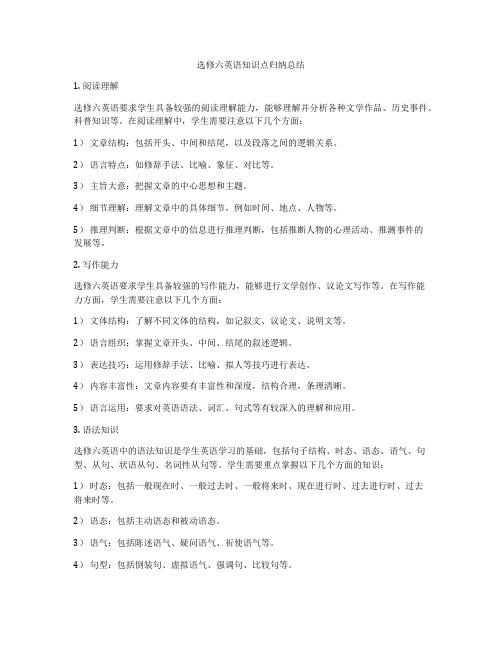
选修六英语知识点归纳总结1. 阅读理解选修六英语要求学生具备较强的阅读理解能力,能够理解并分析各种文学作品、历史事件、科普知识等。
在阅读理解中,学生需要注意以下几个方面:1)文章结构:包括开头、中间和结尾,以及段落之间的逻辑关系。
2)语言特点:如修辞手法、比喻、象征、对比等。
3)主旨大意:把握文章的中心思想和主题。
4)细节理解:理解文章中的具体细节,例如时间、地点、人物等。
5)推理判断:根据文章中的信息进行推理判断,包括推断人物的心理活动、推测事件的发展等。
2. 写作能力选修六英语要求学生具备较强的写作能力,能够进行文学创作、议论文写作等。
在写作能力方面,学生需要注意以下几个方面:1)文体结构:了解不同文体的结构,如记叙文、议论文、说明文等。
2)语言组织:掌握文章开头、中间、结尾的叙述逻辑。
3)表达技巧:运用修辞手法、比喻、拟人等技巧进行表达。
4)内容丰富性:文章内容要有丰富性和深度,结构合理,条理清晰。
5)语言运用:要求对英语语法、词汇、句式等有较深入的理解和应用。
3. 语法知识选修六英语中的语法知识是学生英语学习的基础,包括句子结构、时态、语态、语气、句型、从句、状语从句、名词性从句等。
学生需要重点掌握以下几个方面的知识:1)时态:包括一般现在时、一般过去时、一般将来时、现在进行时、过去进行时、过去将来时等。
2)语态:包括主动语态和被动语态。
3)语气:包括陈述语气、疑问语气、祈使语气等。
4)句型:包括倒装句、虚拟语气、强调句、比较句等。
5)从句:包括定语从句、状语从句、名词性从句等。
4. 词汇量选修六英语要求学生具备一定的词汇量,能够熟练运用各类词汇进行听、说、读、写等方面的应用。
学生需要注意以下几个方面的词汇知识:1)常用词汇:包括日常生活中常用的词汇,如数字、颜色、家庭关系、学科名称、职业名称等。
2)高频词汇:包括高频单词和短语,如情感词汇、动词短语、形容词短语等。
3)专业词汇:包括与学科内容相关的专业词汇,如历史、地理、生物、化学、物理等学科的专业词汇。
- 1、下载文档前请自行甄别文档内容的完整性,平台不提供额外的编辑、内容补充、找答案等附加服务。
- 2、"仅部分预览"的文档,不可在线预览部分如存在完整性等问题,可反馈申请退款(可完整预览的文档不适用该条件!)。
- 3、如文档侵犯您的权益,请联系客服反馈,我们会尽快为您处理(人工客服工作时间:9:00-18:30)。
Unit 11. faith Un. 信任,信念,信心+in ;宗教信仰We always have faith in the quality of your products.a strong faith2. consequently adv. 因此,所以My car broke down, and consequently I was late.3. aim Cn. 目标,目的,意图Un. 瞄准v. 努力,力争;瞄准,对准The main aim of the course is to improve your writing skills.What’s your aim in life?take aim at…The hunter took aim at the lion.We aim to give every student an equal chance of education.We study day and night, aiming at winning the scholarship.The hunter aimed his gun at a deer but didn’t shoot.4. conventional adj. 传统的,按惯例、习俗办事的,守旧的Internet connections through conventional phone lines are very slow.5. typical adj. 典型的,有代表性的+ofThe painting is typical of his early works.6. evident adj. 明显的,明白的It is evident that he is the best person for the job.It must be evident to all of you that he has made a mistake.7. adopt v. 采用,采纳;收养,过继We’ll adopt a new plan to help the victims.His mother had him adopted because she couldn’t look after her son herself.8. possess v. 拥有,占有,具有Because of his gambling, he lost everything he possessed.possession n. 拥有;个人财产,私人财物(常pl.)Dangerous drugs were found in her possession.She was found in possession of dangerous drugs.9. convince v. 使确信,使明白+sb. of sth.;说服+sb. to do sth.He convinced me of the difficulty of the work.He parents cannot convince her that she has made a wrong decision.I’ve been convincing John to come with me.10. coincidence. n. 巧合;巧合的事—I’m going to Paris tomorrow. —What a coincidence! So am I.By coincidence, we were travelling on the same train that way.11. a great deal 大量的+of Un.12. score n. 二十three score and ten studentsscores of studentsa score of students13. on the one hand … on the other hand…一方面…另一方面…On the one hand, I’d like to eat out, but on the other hand, I should try to save money.on the other hand 另一方面He is clever, but on the other hand, he makes many mistakes.14. attempt v. 努力,使徒,尝试The prisoners attempted to escape, but failed.You have attempted a difficult task.I attempted walking along the rope.15. allergic adj. 过敏的+to sth.I don’t like cats because I’m allergic to them.16. aggressive adj. 好斗的,挑衅的,侵略的;进取的A successful business has to be aggressive.17. in the flesh 亲自,本人,活生生地He looks much shorter in the flesh than on the TV.18. bunch n. 串,束+ofI’ll send her a bunch of flowers.19. preference Un. 偏爱,爱好,喜爱+for…Cn. 偏爱的事物A polar bear has a preference for cold weather.in preference to =rather than 而不是20. display v./n. 展出,陈列,展示All the exam results will be displayed on the notice board.on display=on show 陈列,展出21. appeal to 吸引The cartoon appeals to many young people.appeal v. 上诉,申诉+to ;呼吁,恳求+to sb. for sth.22. reputation n. 名声,名誉have a good/bad reputationdamage/ruin one’s reputationearn/establish/build a reputation23. house v. 给…提供住所;收藏,安置The government promised to house the refugees.The collection is currently housed in the British Museum.Unit 21. poetry Un. 诗(总称)poem Cn. 诗poet Cn. 诗人2. convey v. 传达,送达+sth. to sb. ;传送,运送,输送+sb./sth. from…to…Please convey my thanks to your wife.A taxi conveyed us to the train station.3. rhyme n. 韵v. 押韵4. flexible adj. 可弯曲的,有弹性的,柔韧的;可变通的,灵活的We can visit you on Saturday or Sunday. Our plans are very flexible.5. take it easy 放松,不过分努力,不做过多6. run out of vt. 用完,耗尽(主语是人)run out vi. 用完,耗尽(主语是物)On our way to Beijing yesterday, we ran out of gas.On our way to Beijing yesterday, our gas ran out.7. be made up of 由…组成=consist ofThe committee is made up of five members.Five members make up the committee.make up 组成;化妆;编造8. tease v. 嘲笑,嘲弄,招惹,逗弄Stop teasing the cat.Don’t take what she says seriously. She was only teasing.9. minimum n. 最小量,最低限度adj. 最小量的,最低限度的a minimum of workminimum depth10. in particular 尤其,特别be particular about 挑剔的11. transform v. 改变,变化,使改观+intoThe magician transformed the rabbit into a man.Water can transform a desert into a garden.12. exchange v. 交换exchange sth. (with sb.)exchange A for B 用A交换BUnit 31. start (sb.) off (on sth.) 使…开始进行…2. abuse n./vt. 虐待;滥用,妄用child abusephysical abuseabuse of poweralcohol abusea much abused wife3. stress n. 压力,重压,紧张under stressstressful adj. 压力重的,紧张的stressed adj. 焦虑不安的,心力交瘁的4. ban v. 禁止,取缔+sb. from doing sth. –banned-bannedSmoking is banned in this building.He has been banned from driving for a year.5. due to 因为,由于The team’s success was largely due to their efforts.6. tough adj. 困难的,难对付的,费力的;坚强的,能吃苦耐劳的;彪悍的,粗暴的,醋业的;咬不动的a tough customera tough job7. be addicted to 对…上瘾的,对…着迷的He has become addicted to alcohol.8. be accustomed to 习惯于We are accustomed to working together.accustom sb. to 使sb.习惯于…It took a while for me to accustom myself to the new rules.9. withdrawal n. 收回,取回,撤回,撤退the withdrawal of a product from the marketwithdraw v. 收回,取回,撤回,撤退–withdrew-withdrawn10. quit v. 停止,离开– quitting - quit/quitted - quit/quittedI wish all of you could quit complaining.We have done what we can. Let’s quit.Most of the smokers said that they want to quit the habit.He quit his job after an argument with a colleague.11. effect n. 结果,影响+of…on…affect vt. 影响12. abnormal adj. 不正常的,变态的,反常的abnormal behaviour13. breathless adj. 气喘吁吁的,喘不过气来的The long walk left Jane feeling breathless.14. take sb. off sth. 使sb.离开(工作、职位等),调离(常被动)15. unfit adj. 身体不适的,体格不佳的;不适合的,不能胜任的+for… /+to do…The captain is still unfit and will miss tonight’s game.The water is unfit to drink.He is unfit for the job.16. strengthen v. 加强,增强,巩固The wind had strengthened overnight.Repairs are necessary to strengthen the bridge.17. resolve n. 决心,坚定的信念+to doRecent events strengthened his resolve to find the truth.18. decide on/upon 决定,选定Have you decided on the date for the wedding?19. feel like 想要,想做+sth./doingI feel like a drink.I feel like smoking a cigarette.20. desperate adj. 绝望的,孤注一掷的,铤而走险的;渴望的,极想的,非常需要的His increasing financial difficulties forced him to take desperate measures.I was desperate to see her.He was desperate for a cigarette.21. weaken v. (使)虚弱,衰弱,削弱;动摇Nothing can weaken his resolve to continue.You mustn’t agree to do it. Don’t weaken.22. ashamed adj. 惭愧的,羞愧的+of sth. / to do /thatI felt ashamed of the things I said to him.You should be ashamed of yourself for telling such lies.I’m ashamed to admit that I’ve never read any of his books.I’m ashamed that I haven’t replied to her letter yet.23. in spite of =despite prep. 不管,尽管,任凭24. get into 习惯于,养成某种习惯How did you get into the drugs?I’ve got into the habit of turning on the TV as soon as I get home.25. in the first place 首先(常用于句首);当初(常用于句尾)26. at risk 有危险,冒风险rink v. 冒…危险;使遭受危险He is risking his health by smoking.27. immune adj. 免疫的,有免疫力的+tobe immune to disease28. spread v. 展开,摊开,打开;传播,散布,流传;蔓延,扩散,散开–spread-spreadSpread a map out on the floor.spread rumors about sb.Water began to spread across the floor.29. infect v. 传染,使感染+sb. with sth.30. inject v. 注射inject sth. into sb.inject sb. with sth.31. spill v. 泼出,溢出,洒出–spilled-spilled /spilt-spilt32. prejudice n. 偏见,成见+againsthave prejudice against fat people33. judgement Un. 判断力,识别力Cn. 看法,意见,评价+about/onHe refused to make a judgement about the situation.Unit 41. consume vt. 消耗,耗费Only 27% of the paper we consume is recycled.2. compare v. 比较compare A with/to Bcompare A to BThe poet compares the woman he loves to red, red rose.3. random adj. 胡乱的,任意的The winning numbers were randomly selected by computer.The information is processed in a random order.4. phenomenon n. 现象pl. phenomena5. subscribe to 同意,赞成;订阅,订购You can subscribe to this magazine for $32 a year.6. a large quantity of /large quantities of +Cn./Un. (与quantity主谓一致)A large quantity of earth was washed away.Large quantities of earth were washed away.7. tend to do 往往会,常常就When you are exhausted, you tend to make mistakes.tendency n. 倾向,趋势,趋向I have a tendency to talk too much when I’m nervous.8. go up 上升,上涨The price of cigarettes is going up.9. data pl. 数据(平时当单数)sing. datum10. result in 导致result from 由…导致The driver’s carelessness resulted in the accident.The accident resulted from the driver’s carelessness.11. opposed adj. 强烈反对的be opposed to sth. 反对They are totally opposed to smoking.12. state v. 陈述,说明,声明He stated clearly that he knew nothing about it.There is no need to state the obvious.13. range n. 种类,一系列+of ;范围,界限;射程There is a full range of activities for children.Most of the students are in the 17 to 20 age range.14. keep on 继续,反复做You keep on making the same mistakes.Keep on until you get to the church.15. glance v. 瞥,匆匆一看,扫视He glanced at his watch.He glanced around the room.16. economical adj. 经济的,节约的economic adj. 经济的17. on behalf of sb. = on sb.’s behalf 代表Mr. Knight can’t be here. So his wife accept this prize on his behalf.On behalf of the department , I’d like to thank you all.18. advocate v. 拥护,支持,提倡The group doesn’t advocate the use of violence.Many experts advocate rewarding your child for good behaviour. 19. electrical adj. 与电有关的electrical engineerelectric adj. 带电的,通电的electric lightselectrical equipment/appliance20. so/as long as 只要We will go out so long as the whether is fine.21. casual adj. 随便的,漫不经心的,不在乎的He tried to sound casual, but I knew he was worried.22. circumstance n. 条件,状况,环境in/under no circumstances 决不,无论如何不Under no circumstances should you lend him any money.Don’t open the box in any circumstances.23. refresh v. 使恢复精力,使凉爽The long sleep refreshed her.24. count v. 重要Every point in the game counts.It’s the thought counts. 贵在心意Unit 51. take risks =take a risk 冒险He is willing to take risks and try new thingsrisk v. 冒…的危险He risked losing everything.2. alongside prep./adv. 靠着/沿着…旁边,与…并排He spent several weeks working alongside the miners.Children’s prices are shown alongside adult prices.3. equipment Un. 设备a piece of equipmentequip v. 装备,配备equip sb. with sth.They equipped themselves with a pair of axes and set out for the forest.They were equipped with a pair of axes and set out for the forest.4. appoint v. 任命,委派He was appointed as chairman.A committee was appointed to consider the plan.He has been appointed to the State Court.5. evaluate v. 评价,评估,估计The teacher evaluated the performance of each student.evaluation n.6. burn sth. to the ground 把…烧为平地,把…烧为灰烬He has no place to live in because his house was burned to the ground.7. fountain n. 喷泉v. 泉水般地喷出或涌出A fountain of blood was pouring from his chest.9. make one’s way.They made their way towards the centre of the town.They made their way along the road.They made their way up the stairs.10. potential n. 潜力,潜能,可能性adj. 潜在的,有可能的She has the potential to become a champion.He is young, but he has shown a lot of potential.a potential danger11. vary v. 变化+in/+from…to…variety n.a variety of 各种各样的various adj. 各种各样的12. bathe v. 洗澡bath n. 洗澡Have you bathed the baby yet?I bathe every day.13. arouse v. 激起,引起,激发arouse sb.’s interest14. reward v. 奖励,奖赏,给予报酬He rewarded us for helping him.She started singing to the baby and was rewarded with a smile.15. concern vt. 涉及,与…有关=be concerned with16. guarantee v. 保证,担保,保障We can’t guarantee that our flights will never be delayed.The ticket will guarantee you free entry.We guarantee to deliver your goods within a week.17. panic v./n. 惊慌–panicked-panickedThe gunfire panicked me.I panicked when I saw smoke coming out of my car.There is no point getting into a panic about the exams.。
